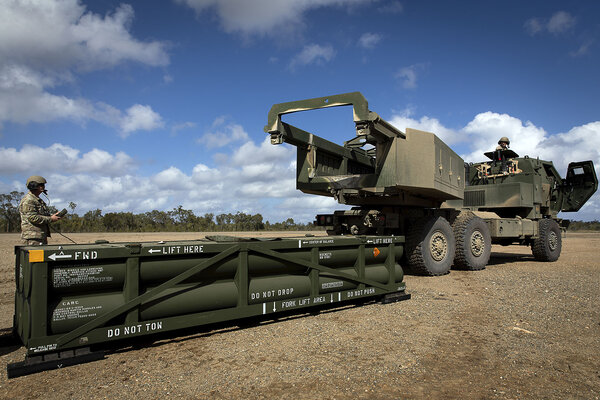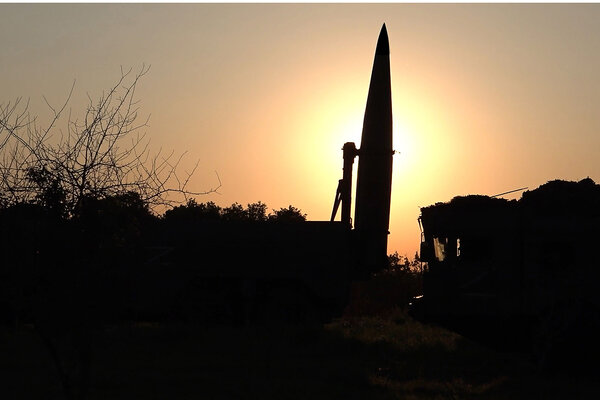Why Putin’s threats to use nuclear weapons against Ukraine sound different this time

The Kremlin has created multiple “red lines” during the conflict in Ukraine, boastfully mentioning Russia’s massive strategic nuclear weapons, but it has done nothing to stop Ukraine or its Western sponsors from crossing them.
It took place when Ukraine obtained brand-new, potent Western weapons. That occurred when Kyiv attacked Russian airfields, refineries, and even the Kremlin itself with its own drones.
It occurred most recently when Ukrainian military genuinely entered Russian territory. Because of this, many NATO officials as well as Ukrainians have come to the conclusion that Russian President Vladimir Putin’s nuclear bluster is a sophisticated ruse.
However, Mr. Putin stated that this time is different when he issued a warning last Thursday, saying that Moscow will view it as a blatant act of war by NATO if Ukraine uses missiles built in the United States, France, or the United Kingdom to hit targets located deep inside Russia.
Numerous Russian specialists concur. And for the time being, it appears that Washington is taking his warning seriously and is delaying allowing Ukraine to utilize the weapons. Russia has been increasingly irritated by the West’s apparent lack of fear of nuclear conflict.
Sergei Strokan, a foreign affairs commentator for the Moscow newspaper Kommersant, claims that there is no deterrence. He claims that terror propelled both sides to the negotiating table during the Cold War in an effort to reduce hostilities and regulate nuclear weapons.
According to him, there is a rising sentiment that the West needs a wake-up call—something that would force them to realize that, by intensifying their attacks against Russia, they are gambling with nuclear war.
The conflict in Ukraine and deterrence
In response to a journalist’s question, Mr. Putin stated that the use of the weapon types under discussion—British and French cruise missiles and American-made ATACMS ballistic missiles—was different from earlier red-line scenarios because they are too advanced for Ukrainians to operate alone.
He said that in order to carry out strikes deep within Russia, they would need direct support from NATO as well as direction and targeting from satellites.

This will imply that NATO members, which include the US and other European nations, are at war with Russia. And if that’s the case, we will respond appropriately to any threats that are posed to us, taking into account the shift in the conflict’s fundamental nature, stated Mr. Putin. It appears that the Kremlin is viewing this challenge as the last straw.
To remind the West that Russia is a nuclear superpower that should not be taken lightly, hawkish members of Mr. Putin’s security elite, led by foreign policy dean Sergey Karaganov, have been publicly pressuring him to “restore deterrence” by launching a demonstration nuclear strike for more than a year.
The Russian media is full of rumors on the response the Kremlin might be considering, though it’s unclear what it might be. On the gentler end of the scale are actions like severing diplomatic ties, particularly with the NATO member that Moscow considers to be the most aggressively antagonistic—the United Kingdom.
A demonstration nuclear weapons test, which Russia hasn’t conducted since 1990, is an additional suggestion. According to some accounts, Novaya Zemlya, the former Soviet nuclear testing facility in the Arctic, has already been preparing for such a scenario.
RECOMMENDATION:Mark Robinson’s campaign in North Carolina fell apart for the reason, “We are staying in this race.”
Former Kremlin advisor Sergei Markov suggests that attacking NATO airfields in Poland and Romania—where he claims, “We know Ukrainian F-16s are based”—might be a more effective reaction. Since those NATO missiles would most likely be fired at us by this aircraft, we would consider them to be real targets.
The calculations for deploying nuclear weapons may be drastically altered by impending revisions to Russia’s formal nuclear doctrine.
Currently, Russia would only be willing to deploy nuclear weapons in the event that a nuclear-armed force invaded the nation or if the Russian state’s fundamental existence was in jeopardy during a conventional fight.

According to Mr. Markov, the proposed changes would make using tactical nuclear weapons less of a barrier, potentially making them a necessary tool in any battlefield in the future.
The requirement that Russian statehood be in danger can be changed in another version to allow the use of the weapons in situations where Russian “strategic interests” are under danger. Additionally, if non-nuclear states are invading Russia, they might be used against them if they are allied with nuclear-armed ones.
Fear of nuclear war
Since the start of the conflict in Ukraine, the proportion of Russians who fear nuclear war has increased, from about 25% to over 33%, according to expert Alexei Levinson of the Levada Center, the country’s only independent polling organization.
It is the second-biggest dread, according to our focus groups, behind concern for one’s own and one’s immediate family’s safety. “It is at a consistently high level and has escalated since the special operation began.”
This week, Alexei Arbatov, one of Russia’s foremost security specialists, told the daily Nezavisimaya Gazeta that the current course of events is extremely dangerous due to the general perception in the West that Russia would never deploy nuclear weapons.
He declared, “This is a very serious misconception: nuclear weapons will be used at some point, despite the risk of escalation and general catastrophe.”
Mr. Strokan contends that observers in the West fail to see the degree of pressure that hawks on Mr. Putin’s right, like Mr. Karaganov, the proponent of nuclear strikes, are exerting on him.
“Without Putin, we would most likely have a collective Karaganov in charge. He is currently the most centrist politician in Moscow,” he claims. “Even now, they are asking, ‘Why haven’t we pressed the button already?’ with open impatience.”